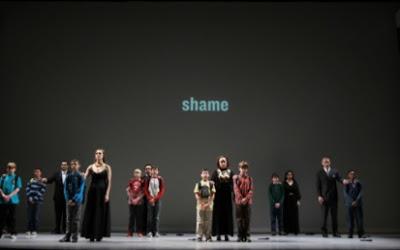Opera Philadelphia mounts Owen Wingrave
by Paul J. Pelkonen

Generation gap: a scene from Owen Wingrave. Image © 2013 Opera Philadelphia.
Among the last three operas by British composer Benjamin Britten, Owen Wingrave is the least known and the most difficult. The story of a committed pacifist who pays the ultimate price for his beliefs was originally composed for a BBC television broadcast in the 1970s. (Its TV roots might account for the paucity of performances.) Here, Opera Philadelphia mounted the work in collaboration with the Curtis Opera Theater as part of its regular season on Broad Street.Owen Wingrave was Britten's second collaboration with librettist Myfanwy Piper after The Turn of the Screw. It was also his second opera based on a ghost story by Henry James. Owen himself (played by baritone Jamez McCorkle at Friday night's performance) also offers a thorough exploration of the role of "other," a common theme in other Britten operas of the composer’s mature period. It is written in a shifting, twelve-tone style and is almost a-melodic, with only the famous "Paramore" chorus serving as a silver threatd between this world and the next.
This new production by director Daniel Fish attempts to update the the opera to make a profound statement about today's culture of violence and the right's obsession with arming America's youth. It features a chilling scene in Act II where the children's chorus appears, wearing everyday kids' clothes. Standing and singing the ascending "Paramore" chorus, their backpacks that are silently filled with plastic handguns in anticipation (or facilitation) of the next school shooting. This is a potent, relevant message although it has little to do with the opera or its source material.
Mr. McCorkle has a pleasing, mid-sized instrument but was condemned to spend most of the opera in a state of lethargy until the very end of the second act. This was pacifism as the life of a couch potato, surrounded by hectoring relatives. He spent time staring at televisions, which mostly featured conductor George Manahan working in the pit via a live feed. At one point in the first act, the singer made popcorn onstage using a plugged-in microwave. He did not share it.
Mr. Fish and set designer Laura Jellinek present this opera on a minimal set, a single couch that reminded one of the Willy Decker Traviata. The singers hovered in corners of the wide set, with nowhere to hide as they pretended to hide from each other. They were lead by soprano Nian Wang as Kate, whose love for Owen leads her to urge him on to his eventual death in the locked, haunted room in the family mansion of Paramore. Also making Owen's life difficult, a trio of Wingrave friends and relatives. Shir Rozzen played Miss Wingrave. Rachel Sterrenberg was Mrs. Coyle, and Anna Davidson played Mrs. Julian. Confusing direction and similar costumes made these three artists interchangeable as if they were a trio of Shakespearean witches.
The most impressive male voice on display here belonged to bass Anthony Reed in the key role of Spencer Coyle, Owen's friend and former military instructor. His sonorous, crisp bass anchored the opera's ensembles and provided able support to the other artists. Young tenor Spencer Lang displayed a fine voice as Lechmere, Owen's former schoolmate. Mention must also be made of the skilled Curtis players under Mr. Manahan. His exceptional, pin-point conducting of this score made even the most casual listener grasp the composer's intent.

